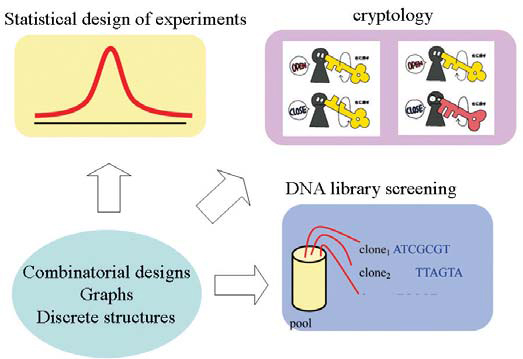Comprehensive List of Researchers "Information Knowledge"
Department of Computer Science and Mathematical Informatics
- Name
- JIMBO, Masakazu
- Group
- Mathematical Informatics Group
- Title
- Professor
- Degree
- Dr. of Science
- Research Field
- Discrete mathematics / Statistics / Coding theory / Cryptology / Design of experiments

Current Research
Discrete Mathematics and its Application to Statistics and Information Sciences
OUTLINEMy research interests cover the areas of discrete mathematics and statistics. Discrete structures inhere in various mathematical models. Such discrete structures often affects the efficiency or optimality of the analysis of experiments or computer simulations. I am interested in the research of optimal discrete structures arising form various applications in information sciences.
TOPICS
(1) Combinatorial designs and their applications
In the field of the statistical design of experiments, combinatorial design plays an important role. Combinatorial structures, constructions and the existence of combinatorial design have been studied for efficiency in statistical inference. For example, assume that we want to weigh four items. Person A weighs each item one by one. Person B weighs all three items at the same time and continues this process four times by choosing three items in order. There may be some difference in the accuracy of the weight estimates of each item. Actually, this problem is related to combinatorial designs such as Hadamard matrices.
A combinatorial design is closely related to classical coding theory and has new applications to Code Division Multiple Access (CDMA), Optical Orthogonal Code (OOC), or frequency hopping multiple access. In the last three decades, cryptology has been studied as an important field of discrete mathematics. It is a key Internet technology. In cryptology, many kinds of algebraic and discrete mathematics are utilized such as number theory, finite geometry, algebraic curves on finite fields, orthogonal arrays, and combinatorial designs.
My research group focuses on the discrete structures included in these application areas and studies some properties of such optimal combinatorial structures, their existence and their construction problems.
(2) Combinatorial problems in a pooling design for DNA library screening and positive detecting algorithms
In DNA library screening, millions of clones consisting of short strings of A, T, G and C nucleotides are treated. From these various clones, we want to find a few positive clones that are positive in some tests. If we individually test each clone, we need millions of experiments, requiring a huge cost. In this case, we often use a"group testing"method. That is, we put many types of clones in a pool and test the pool. If the result for the pool is negative, then in a single experiment, we have found that all clones included in the pool are negative by a single experiment. If positive, we know that there is at least one positive in the pool. By constituting many kinds of pools and pursuing tests for them, we obtain experimental results. It is important to efficiently detect positive clones from these results. Therefore, we need an efficient algorithm to detect positives together with an optimal pooling design. This area is related to both combinatorics and algorithms.
(3) Statistical data analysis for student exams
Statistical analysis for discrete data such as surveys by questionnaires and multiple choice exams are often required. In such data analysis we need to develop a statistical method suitable to its purpose. Our group has been analyzing student exam data to estimate the basic learning ability or the degree of understanding of each student. This is a joint work with a private company.
FUTURE WORK
We aim to advance the study of discrete mathematics and their applications to many areas of information sciences including coding theory, cryptology, communication systems, genetics, etc.

Figure : Discrete mathematics and its application
Career
- Masakazu Jimbo received a Dr. of Science degree in Information Science from the Tokyo Institute of Technology in 1985.
- He was an Assistant Professor at the Tokyo University of Science, a Lecturer at Tsukuba University, a Professor at Gifu University, and a Professor at Keio University.
- He is currently a Professor in Graduate School of Information Sciences, Nagoya University.
Academic Societies
- Japan Mathematical Society
- Japan Statistical Society
- Japan Applied Mathematics Society
- JIPS
- Institute of Combinatorics and its Applications
- AMS
Publications
- M. Mueller and M. Jimbo, Consecutive positive detectable matrices and group testing for consecutive positives. Discrete Math., 279 (2004), 369-381.
- M. Mueller and M. Jimbo, Erasure-resilient codes from affine spaces. Discrete Appl. Math., 143 (2004), 292-297.
- K. Ozawa, M. Jimbo, S. kageyama, and S. Mejza. Optimality and constructions of incomplete split-block designs. J. Statist. Plann. Inference, 106 (2002), 135-157.








